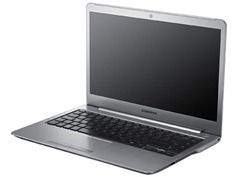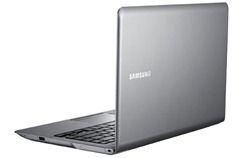Let the Gaming begin! Using the Ultrabook branding, Samsung have officially announced two interesting Ultrabooks that extend the category in a number of directions. The Samsung Series 5 Ultrabooks will offer a larger screen option, terabyte storage and AMD HD7550M discreet graphics in some models.
Samsung Series 5 Ultrabooks launched in homeland, South Korea today.
The press release introduces two models…
The Series 5, 14-inch product has a thickness of 20.9mm and weighs 1.8kg Not exactly the lightest of Ultrabooks but to be fair, Intel have never set a weight restriction on Ultrabooks. It’s got an aluminium exterior and houses a 1TB Hybrid Hard drive. The Hybrid HDD/SSD also appears on the Acer Aspire S3. In addition, Samsung have included AMD’s ‘high-performance’ Hybrid Graphics HD7550M. As with the hybrid hard drive, the 14” screen and the weight, the discreet graphics are in-spec. We’re not sure about that 20.9mm thickness though.
Update: Intel confirmed to us this afternoon that these are officially Ultrabooks.
The 13-inch Series 5 product has a thickness of 14.9mm, weighs 1.4kg, focuses on mobility and includes a 500GB drive. There’s no discreet graphics on this model as far as we can see.
A 128GB SSD is available as an option but the hybrid hard drive options will use the 16GB SSD and Express Cache to speed things up. Full size LAN, HDMI and VGA ports are included and the devices have a matt display. One can assume these will be available in Core i3, i5 and i7 variants and that they will roll out across the globe although there’s no confirmation of final specs or any word from other Samsung offices yet.
Both models start at the Korean price equivalent of around $1150.
One we get the full spec we’ll add these into the database where we’ll start to see an interesting overlap between the Ultrabooks and the Ultrabook alternatives.













Too heavy, too thick, too large. They may be thin/light for their specs, but these are NOT ultrabooks, IMO, just svelte laptops.
It’s an interesting option. Way too expensive for an AMD processor; insanely expensive for an AMD processor notebook.
Its not an amd processor notebook. It will run Sandy Bridge. The extra graphics are from amd.
hybrid model as HDD cache is nearly worthless. I wonder why manufactures just can’t put the entire OS on the SSD instead, then everything else left for the HDD.
It also begs the question: Does implementing an SSD + HDD solution really save that much money over a single larger-capacity SSD? I would think that from a space conservation perspective, not to mention the additional complexity (given that at least on the Acer it’s not as simple as SSD = boot drive, HDD = data drive) and battery usage, that the pros don’t really outweigh the cons.
Hybrid drives are a compromise solution that essentially uses a small SSD, think only a few GB, to act as cache memory booster for the hard drive.
Drives like those produced by Seagate are a actual two in one hybrid design. So looks like a regular hard drive and retains the high capacity of a normal hard drive. Meaning it’s more a enhanced hard drive.
The claimed benefit is derived from gaining part of the benefits of a SSD with faster boot time, lower power usage, and improved reliability.
The downside is the speed gains mostly rely on the drive predicting what data you want cached and that means data not cached is accessed much slower, but the longer you use the system then the more it will better predict what data you need cached.
Hybrid drives can also survive the death of the SSD, they’ll just become slower.
Power usage may not be that good though when it’s factored that hybrid drives are more likely to constantly spin up and down. Spinning up being the activity that draws the most power by a hard drive. Along with producing more noise because of this cycling.
Other down side is that classic hard drive recovery services won’t work with a hybrid drive because of the way it works and is tied tot he OS.
Other hybrid methods probably won’t come into play until Ivy Bridge comes out. Intel is developing ways to boost performance with a SSD that can be used with any hard drive.
We may also then see more separate dual SSD and HDD installation set ups, which can also be used to set the SSD as the boot drive.
Oh, it’s an Intel CPU with an AMD graphics card (hopefully switchable), in that case they’ve got a great niche! Get higher-end graphics power now and a larger 14″ screen in a pretty thin and pretty light package.
This looks to be the best graphics perf you’ll get out of a laptop at least until the summer Ivybridge refresh. I see where they’re going with it now. -Thanks Chippy!
Adam
I should say “best graphics perf you’ll get out of an ultrabook”. (*Sigh, wish I could edit my posts…)
2 Yurij ?????…? ??? ?? Enigmail?? ? ???? ????, ?? ?????????????? ? ??????????? ????? ?? ? ???.2 motraker ?????…??????????, ??????????. ? ??? ???????, ????? ????????? ? ???????? Quote Colors ????????????? ?? ?????? ??? ????????? ??????, ?? ? ??? ??????????????? ?????? (reply)????? ????? ?????? ?????????? :-) 2 Svyatogor ?????…??? ?????????? ? ??????? Seek ??????????. ????????? ?????? ??? ?????????? ? ?????? ?????.??? ??, ??????? ????? ???????, ?????? ? ???? ?? ??????-?? ???????????. ?? ?? ?????? ?????? ???????. ???????!
This is my first time pay a visit at here and i am truly impressed to read everthing at single place.